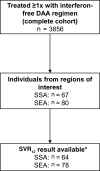Low Risk of Failing Direct-Acting Antivirals in People With Human Immunodeficiency Virus/Hepatitis C Virus From Sub-Saharan Africa or Southeastern Asia: A European Cross-Sectional Study
- PMID: 36320198
- PMCID: PMC9605702
- DOI: 10.1093/ofid/ofac508
Low Risk of Failing Direct-Acting Antivirals in People With Human Immunodeficiency Virus/Hepatitis C Virus From Sub-Saharan Africa or Southeastern Asia: A European Cross-Sectional Study
Abstract
Background: Several studies have reported suboptimal efficacy of direct-acting antivirals (DAAs) to treat hepatitis C virus (HCV) subtypes endemic to sub-Saharan Africa (SSA) and Southeastern Asia (SEA). The extent of this issue in individuals with human immunodeficiency virus (HIV)/HCV from SSA or SEA residing in Europe is unknown.
Methods: We retrospectively analyzed data from several prospective European cohorts of people living with HIV. We included individuals with HIV/HCV who originated from SSA or SEA, were treated with interferon-free DAAs, and had an available HCV RNA result ≥12 weeks after the end of treatment. The primary outcome was sustained virological response at least 12 weeks after the end of treatment (SVR12).
Results: Of the 3293 individuals with HIV/HCV treated with DAA and with available SVR12 data, 142 were from SSA (n = 64) and SEA (n = 78). SVR12 was achieved by 60 (94% [95% confidence interval {CI}, 86%-98%]) individuals from SSA and 76 (97% [95% CI, 92%-99%]) from SEA. The genotypes of the 6 individuals failing DAA treatment were 2, 3a, 3h, 4a, 4c, and 6j. For 2 of the 4 unsuccessfully treated individuals with available sequence data at treatment failure, NS5A resistance-associated substitutions were present (30R/93S in an individual with genotype 4c and 31M in an individual with genotype 6j).
Conclusions: SVR12 rates were high in individuals with HIV/HCV residing in Europe and originating from regions where intrinsically NS5A-resistant HCV strains are endemic. HCV elimination for this population in Europe is unlikely to be hampered by suboptimal DAA efficacy.
Keywords: coinfection; elimination; hepatitis C virus; human immunodeficiency virus.
© The Author(s) 2022. Published by Oxford University Press on behalf of Infectious Diseases Society of America.
Conflict of interest statement
Potential conflicts of interest. C. I. has received research funding from Gilead, not related to this study. A. M. has received honoraria, travel support, and/or consultancy fees from ViiV, Gilead, and Eiland & Bonnin, all outside the submitted work. K. F. has received honoraria from GSK, AbbVie, and Gilead, all outside the submitted work. G. W. has received unrestricted research grants form Gilead Sciences and Roche Diagnostics, unrelated to this work, as well as honoraria from ViiV, MSD, and Gilead Sciences (paid to his institution). M. C.'s institution received a conference grant from Gilead as well as research grants from Gilead, MSD, and ViiV. M. S. has received grants for conference participation from Gilead and MSD (Merck). J. S.'s institution has received research support and consultancy fees from Gilead, and a speaker’s fee from Janssen Pharmaceuticals, independent from the submitted work. A. R. reports support to his institution for advisory boards and/or travel grants from MSD, Gilead Sciences, Pfizer, and AbbVie, and an investigator-initiated trial grant from Gilead Sciences. All remuneration went to his home institution and not to A. R. personally, and all remuneration was provided outside the submitted work. M. v. d. V. reports honoraria or research grants from AbbVie, Gilead, MSD, and ViiV Healthcare, all outside the submitted work. All other authors report no potential conflicts.
Figures

Similar articles
-
Effectiveness and Safety of Interferon-Free Direct-Acting Antiviral Hepatitis C Virus Therapy in HIV/Hepatitis C Virus Coinfected Individuals: Results From a Pan-European Study.J Acquir Immune Defic Syndr. 2021 Feb 1;86(2):248-257. doi: 10.1097/QAI.0000000000002541. J Acquir Immune Defic Syndr. 2021. PMID: 33079903
-
Safety and efficacy of sofosbuvir-velpatasvir-voxilaprevir for re-treatment of chronic hepatitis C virus infection in patients with previous direct-acting antiviral treatment failure in Rwanda (SHARED-3): a single-arm trial.Lancet Gastroenterol Hepatol. 2022 Jun;7(6):542-551. doi: 10.1016/S2468-1253(21)00399-X. Epub 2022 Mar 3. Lancet Gastroenterol Hepatol. 2022. PMID: 35248212 Clinical Trial.
-
Direct-acting antivirals in hepatitis C virus (HCV)-infected and HCV/HIV-coinfected patients: real-life safety and efficacy.HIV Med. 2017 Apr;18(4):284-291. doi: 10.1111/hiv.12429. Epub 2016 Aug 1. HIV Med. 2017. PMID: 27477612
-
Treatment of chronic HCV genotype 1 coinfection.Curr HIV/AIDS Rep. 2015 Sep;12(3):326-35. doi: 10.1007/s11904-015-0278-4. Curr HIV/AIDS Rep. 2015. PMID: 26228050 Review.
-
Similar Sustained Virologic Response in Real-World and Clinical Trial Studies of Hepatitis C/Human Immunodeficiency Virus Coinfection.Dig Dis Sci. 2018 Nov;63(11):2829-2839. doi: 10.1007/s10620-018-5215-0. Epub 2018 Aug 9. Dig Dis Sci. 2018. PMID: 30094623 Review.
Cited by
-
Rare HCV subtypes and retreatment outcomes in a cohort of European DAA-experienced patients.JHEP Rep. 2024 Mar 25;6(7):101072. doi: 10.1016/j.jhepr.2024.101072. eCollection 2024 Jul. JHEP Rep. 2024. PMID: 39006503 Free PMC article.
References
-
- Polaris Observatory HCV Collaborators . Global prevalence and genotype distribution of hepatitis C virus infection in 2015: a modelling study. Lancet Gastroenterol Hepatol 2017; 2:161–76. - PubMed
-
- Pawlotsky JM. DAA Failures in African patients with “unusual” HCV subtypes: Hey! Didn’t you know there was another world? J Hepatol 2019; 71:1070–2. - PubMed
-
- Wei L, Wang G, Alami NN, et al. . Glecaprevir–pibrentasvir to treat chronic hepatitis C virus infection in Asia: 2 multicentre, phase 3 studies—a randomised, double-blind study (VOYAGE-1) and an open-label, single-arm study (VOYAGE-2). Lancet Gastroenterol Hepatol 2020; 5:839–49. - PubMed
-
- Gupta N, Mbituyumuremyi A, Kabahizi J, et al. . Treatment of chronic hepatitis C virus infection in Rwanda with ledipasvir–sofosbuvir (SHARED): a single-arm trial. Lancet Gastroenterol Hepatol 2019; 4:119–26. - PubMed

